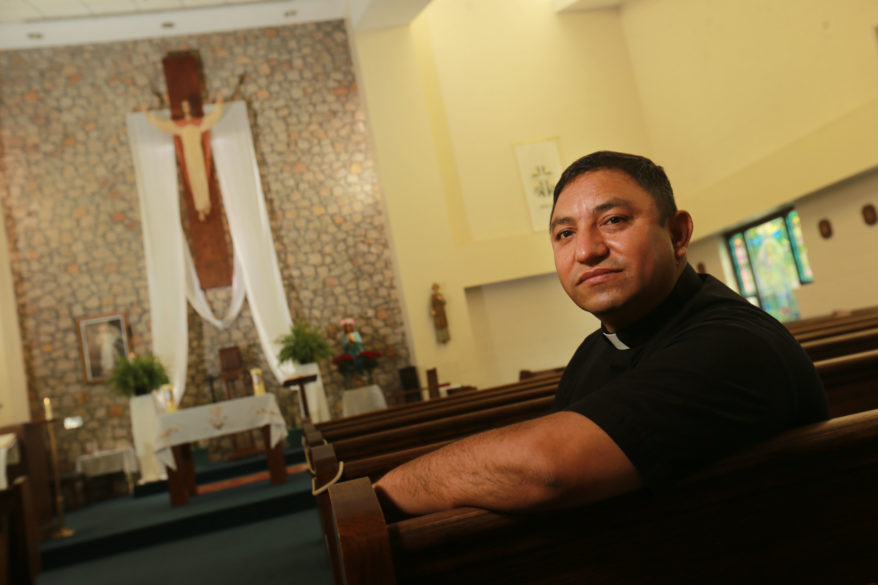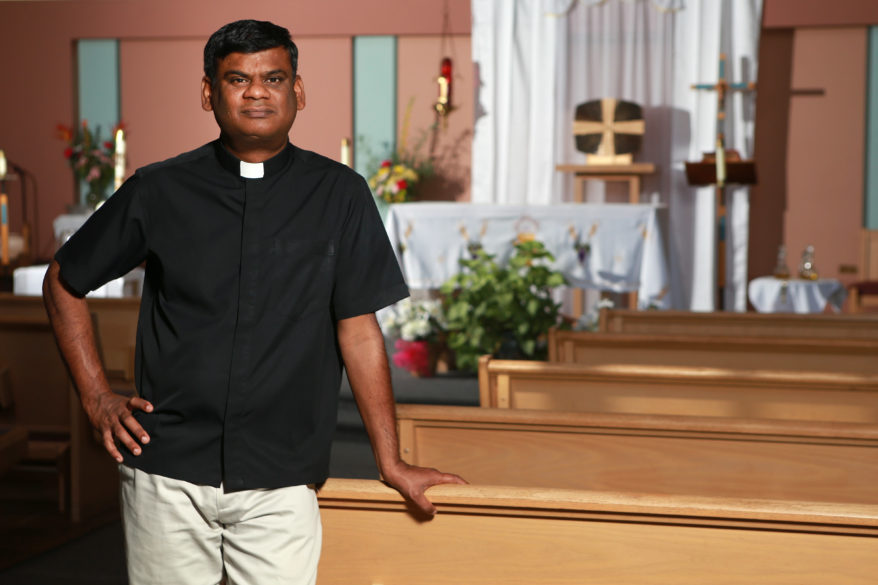“I am really proceeding in my life here with the hope that God will heal the whole world one day from this pandemic … The challenge and the risk gave me a chance to deepen my faith, to deepen my trust in God.”
Rev. Jesuraj Xavier
St. Francis Assisi Parish in New Albany
By Danny McArthur
CORINTH – As pastor of St. James Catholic Church in Corinth, Father Mario Solórzano is responsible for sharing God’s gift in English and Spanish to more than 400 combined members with mass services in Corinth, Belmont and Booneville.
Once COVID-19 hit, that responsibility also included leading his parish through the pandemic.
“Those days were very stressful for me, and sometimes I didn’t know what to do,” Solórzano said.
COVID-19 brought a similarly dramatic change for the Father Jesuraj Xavier, pastor of St. Francis Assisi Catholic Church in New Albany. Early on, he was afraid to leave his home, even for essentials.
His primary concern, he said, was for the members of his community, more so than himself. Xavier was afraid of exposing those he saw regularly as part of his duties to the virus.

“I just stayed at home and the church,” Xavier said. “I had a fear all the time I should not become sick, because if I become sick, the people will be affected if we have to close the church or stop the masses.”
Over the past year, the pandemic would challenge the two pastors in ways they’d never previously experienced, causing them to rethink faith, service and worship for the various rural parishes they serve.
Changing Catholic practices
More than a year ago, as COVID-19 cases began to rise, church leaders received information from the Catholic Diocese for rules they needed to implement, such as using masks, sanitizing, social distancing and, eventually, cessation of in-person services.
St. Francis closed in-person services from mid-March 2020 to May 2020, during which they moved to livestreaming services in Spanish and English.
Xavier found the transition to be difficult, at least emotionally.
“It was a great shock,” Xavier said. “That was not our normal custom, but people didn’t want to miss Mass. Even if they are not able to take part in person, they want to see it.”
Sacred practices, such as offering Holy Communion, had to be altered to minimize coronavirus spread. Funeral masses were paused until 2021, limiting Father Xavier to graveside services. With hospitals limiting visitation, he couldn’t even perform final rites.
“The pandemic has changed the mode of our Catholic practices,” FatherXavier said.
Of the parishes he serves, only St. Francis adopted livestreamed masses. When in-person church services resumed, they came with changes. To shorten services, his church cancelled Sunday classes with kids and adults.
In Fulton, where most of his attendees are English-speaking and older, attendance lessened. Many parishioners had health complications. With a COVID-19 infection forcing them to close for two weeks and some parishioners becoming sick in July and August, some didn’t feel safe attending in person.
Some days, Father Xavier would make the 45-minute drive from New Albany to Fulton to preach to just five people.
“It really discourages you,” he said. “But one thing I am convinced of myself is that I should never be worried about how many people are coming, but I should do what I have to do with the sincerity of my heart.”
At St. James, the church implemented social distancing by moving services to their large family life center. Even before the pandemic, Father Solórzano’s community had begun exploring ways to transmit services in nursing homes. Cameras set up in the sanctuary helped when services moved from in-person to virtual.
“We were blessed because we worked to communicate with everyone in the parish,” Father Solórzano said. “I celebrate by myself many times almost the whole season of Lent and Easter.”
Father Solórzano adapted to the changes forced upon him by the pandemic. He offered moments of prayer on WhatsApp. Members set up sanctuaries inside their homes. He called his parishioners and would visit them outside at a distance. Other times, he might bring something they needed, like food or medicine.
“Thank God I have not been sick, but always I was concerned about the health of people,” Father Solórzano said.
A deepening of faith
Both pastors saw the pandemic’s spiritual and mental toll on their congregations and themselves. For some, the pandemic began to diminish or weaken their faith; for others, it pushed them to become more active and gain a closer relationship to God.

For Father Xavier, faith has been a comfort, especially when he thinks of his friends and family in his native India, where COVID-19 has infected more than 29 million people as of Monday and killed roughly 377,000 of those infected, including three priests within Father Xavier’s home diocese.
The pandemic and its toll have tested Father Xavier in ways he’s never before experienced. But rather than lose faith, Father Xavier said he used the questions in his heart to give him strength.
“Trusting in God, I am really proceeding in my life here with the hope that God will heal the whole world one day from this pandemic and safeguard India and our country as well,” Father Xavier said. “The challenge and the risk gave me a chance to deepen my faith, to deepen my trust in God.”
With COVID-19 vaccines readily available, Father Solórzano has encouraged everyone within his church to receive a shot. And when he hears people spreading misinformation about the vaccine, he tries to encourage members instead to put their faith in God.
For Father Solórzano, vaccination is about more than caring for your own health; it’s about caring for the health of others.
As a man of God, he believes that’s his obligation.
“I believe God is calling me to be responsible for others, too,” he said. “I cannot think only of myself.”
(Reprinted with permission of the Daily Journal – djournal.com. Danny, the community voices reporter, covers social issues and nonprofits for the Daily Journal.)
